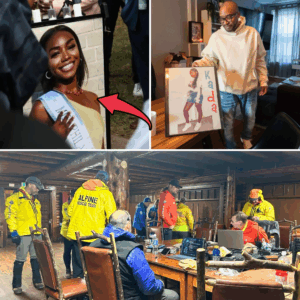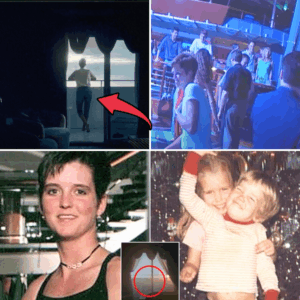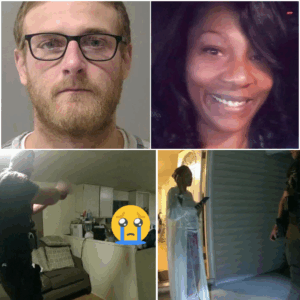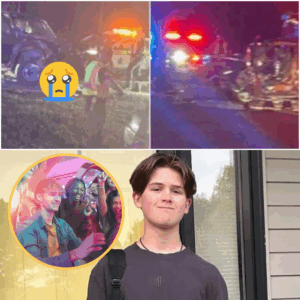On August 22, 2025, Iryna Zarutska, a 23-year-old Ukrainian refugee, was brutally stabbed to death on a Charlotte, North Carolina, light rail train, a tragedy that sent shockwaves through the community and sparked national outrage. The suspect, Decarlos Brown Jr., a 34-year-old man with a history of mental illness and a lengthy criminal record, was arrested at the scene and charged with first-degree murder and committing an act causing death on a mass transportation system. In a chilling development, Brown, speaking from Mecklenburg County Jail, has refused to accept responsibility for the murder, blaming “synthetic materials” in his body and external forces for controlling his actions. His statements, revealed through a recorded phone call with his sister, have exposed a deeply troubled mind and intensified debates over mental health, criminal justice, and public safety. This article explores Brown’s claims, the circumstances of the crime, and the broader implications, drawing from police reports, witness accounts, and public reactions.
The Tragic Death of Iryna Zarutska
Iryna Zarutska’s story is one of hope shattered by violence. Born in Kyiv, Ukraine, she fled her war-torn homeland in 2022 with her mother, sister, and brother, seeking safety in Charlotte, North Carolina. A gifted artist with a degree in Art and Restoration from Synergy College in Kyiv, Zarutska quickly adapted to her new life, mastering English and enrolling at Rowan-Cabarrus Community College. She worked at Zepeddie’s Pizzeria, where she was beloved for her warmth and creativity, and dreamed of becoming a veterinary assistant due to her love for animals. Her obituary described her as a vibrant soul who gifted artwork to friends and family and designed unique clothing that reflected her spirit.
On the evening of August 22, Zarutska boarded the Lynx Blue Line train at Scaleybark station, wearing her work uniform and AirPods, likely texting her boyfriend to say she was on her way home. She sat down, unaware that Decarlos Brown Jr. was seated behind her. Surveillance footage released by the Charlotte Area Transit System (CATS) shows no interaction between them. At approximately 9:50 p.m., Brown pulled a folding pocket knife from his hoodie and stabbed Zarutska three times, including a fatal wound to her neck. Witnesses described a scene of horror, with passengers scrambling to help as Zarutska collapsed, blood pooling around her. She was pronounced dead at the scene, and Brown was arrested on the platform after discarding his bloodied hoodie and knife.
Brown’s Disturbing Statements from Jail
In a recorded phone call from Mecklenburg County Jail, shared by his sister Tracey Brown with The Daily Mail, Decarlos Brown Jr. offered a chilling explanation for the murder, refusing to take responsibility. When Tracey asked, “Out of all people, why her?” referring to Zarutska, Brown replied, “They just lashed out on her, that’s what happened. Whoever was working the materials they lashed out on her. That’s all there is to it. Now they gotta do an investigation as to who was the motive behind what happened.” He claimed that “synthetic materials” or “man-made” substances implanted in his body were controlling his actions, a delusion consistent with his schizophrenia diagnosis. Brown further alleged that Zarutska was “reading” his mind, adding to his paranoia. “I hurt my hand, stabbing her,” he told his sister, adding, “I don’t even know the lady. I never said not one word to the lady at all. That’s scary, ain’t it. Why would somebody stab somebody for no reason?”
These statements align with earlier incidents in Brown’s history. In January 2025, he was arrested for misusing 911 services, claiming that “man-made material” in his body controlled his ability to eat, walk, and speak. Police noted his mental instability at the time, and a judge ordered a competency evaluation in July, which was never completed. Brown’s mother, Michelle Dewitt, told CNN that she had sought an involuntary psychiatric commitment for her son after he exhibited violent behavior, but her efforts failed due to legal barriers. “The system failed him,” she said, a sentiment echoed by Tracey, who believed Brown should not have been on the streets given his mental decline.
A History of Crime and Mental Illness
Brown’s refusal to accept responsibility underscores his long-standing mental health struggles and criminal history. Mecklenburg County records show at least 14 arrests since 2007, including convictions for armed robbery, felony larceny, breaking and entering, and assault. In 2014, he was sentenced to over six years in prison for robbing a man at gunpoint, and after his release in 2020, he was arrested for assaulting his sister and misusing 911 services. At the time of the murder, Brown was homeless, living in a shelter, and out on bail awaiting trial for earlier charges. His schizophrenia diagnosis and documented delusional behavior, including his belief in external control, raised questions about why he was not in a treatment facility.
Charlotte Mayor Vi Lyles called the killing a “tragic failure by the courts and magistrates,” highlighting systemic gaps in handling defendants with mental illness. Mecklenburg County District Attorney Spencer Merriweather told Axios that limited funding for mental health care contributes to such outcomes, as individuals like Brown cycle through the legal system without receiving consistent treatment. Despite these issues, Brown’s statements from jail have drawn little sympathy, with many focusing on the brutality of Zarutska’s death and the need for accountability.
Public and Political Reactions
The murder, captured on graphic surveillance footage, sparked widespread outrage when released on September 5, 2025. The video, showing Brown’s unprovoked attack, went viral on social media, amplifying calls for justice. President Donald Trump labeled Brown a “deranged monster” and demanded the death penalty, stating, “The ANIMAL who so violently killed the beautiful young lady from Ukraine… should be given a ‘Quick’ Trial, and only awarded THE DEATH PENALTY.” He blamed Democratic policies for allowing repeat offenders to remain free, a sentiment echoed by Attorney General Pamela Bondi, who vowed to pursue the maximum penalty, ensuring Brown “will never again see the light of day as a free man.”
Elon Musk criticized judges and prosecutors, urging the public to “name and shame” those who enable violent crime. Conservative commentators pointed to Brown’s post-attack statement, “I got that white girl,” as evidence of a possible racial motive, though police have not charged him with a hate crime, stating that the motive remains under investigation. The racial dynamics—Brown is Black, Zarutska was White—fueled heated debates, with some right-wing influencers alleging media bias in coverage. Meanwhile, Charlotte’s Democratic leadership faced criticism for initial responses that emphasized Brown’s mental health over Zarutska’s loss. Mayor Lyles’ call to avoid sharing the video “out of respect for Iryna’s family” was seen by some as deflecting from the city’s security failures.
Systemic Failures and Calls for Reform
The tragedy exposed vulnerabilities in Charlotte’s public transit and justice systems. The Lynx Blue Line train lacked security personnel in the car where the attack occurred, and Brown was fare-jumping, highlighting lax enforcement. CATS announced plans to increase fare inspections, install ticket validators, and expand security staffing, but critics, including city council member Dimple Ajmera, argued that these measures were overdue. U.S. Secretary of Transportation Sean Duffy launched an investigation into Charlotte’s transit safety, blaming local officials for failing to protect Zarutska.
The case also underscored the challenges of addressing mental illness in the justice system. Brown’s untreated schizophrenia and repeated releases despite his criminal history raised questions about judicial oversight and mental health resources. North Carolina Governor Josh Stein called for increased law enforcement funding, while others debated the balance between rehabilitation and public safety. A GoFundMe campaign for Brown’s legal defense, which claimed he was a victim of systemic failures, was removed after public backlash, as it violated the platform’s policy against fundraising for violent crime defenses.
A Community in Mourning
Iryna Zarutska’s death has left Charlotte and her global community grieving. A candlelight vigil on August 31, 2025, honored her memory, with another planned for September 22. Her family, devastated, chose to bury her in the United States, where she had embraced her new life. Zepeddie’s Pizzeria keeps a candle burning in her honor, remembering her as a “true friend.” Her story—a young woman fleeing war only to meet violence in a place she believed was safe—has resonated worldwide, drawing attention to the vulnerabilities of refugees and the need for safer public spaces.
Conclusion
Decarlos Brown Jr.’s refusal to accept responsibility for Iryna Zarutska’s murder, blaming external forces and “synthetic materials,” reveals a deeply troubled mind and underscores the systemic failures that allowed him to remain free despite his criminal and mental health history. As Charlotte grapples with this tragedy, the case has ignited debates over public safety, mental health care, and judicial accountability. Zarutska’s dreams of a peaceful life in America were extinguished in a moment of senseless violence, leaving a community and a nation demanding justice and reform to prevent such tragedies in the future.




